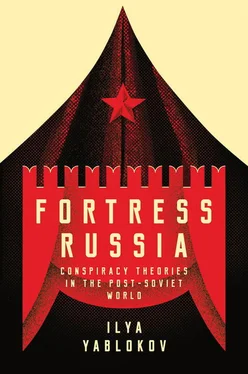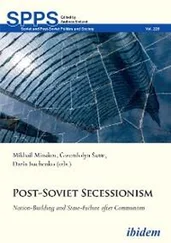1 ...8 9 10 12 13 14 ...77 In the period between the Orange Revolution in Ukraine in 2004 and the presidential elections in Russia in 2008, Pavlovskii frequently used anti-Western conspiracy allegations in his commentaries and interviews, but, like many Russian politicians at that time, he did so with supreme caution. After returning from Ukraine in 2004, he portrayed the defeat of Yanukovich as the first stage in a Western plan ‘to turn Ukraine into a huge testing area for anti-Russian technologies’ ( Tsenzor.net, 2004). He alleged that the West was not interested in Ukraine per se , but that the real goal of the Orange Revolution was to set off revolution in Russia. His words resonated with the Kremlin elites, who feared that a transfer of power from Putin to a successor in 2008 might not go smoothly, and that Russia could repeat the example of its neighbour.
International criticism of Russia’s foreign policy towards Ukraine and Georgia after the regime changes in those countries was attributed by Pavlovskii to the West’s ‘russophobia’ and its determination to use Russia as a scapegoat in the event of a world economic crisis (Dymarskii and Pavlovskii, 2006). He repeated this paranoid interpretation of relations with the West on the eve of the parliamentary elections in Russia in 2007 depicting Russia, in a series of media interviews, as a country besieged by ‘enemies’ who despised Putin and were ready to take active measures against him (see, for example, Al’bats and Pavlovskii, 2007).
To provide ideological underpinning for Kremlin-initiated policies and spread anti-Western conspiracy theories, Pavlovskii created a loose framework of independent foundations, where academics, journalists and even graduates of the faculties of humanities produced ideas which would later be used for political purposes. Historian Alexei Miller noted (2009) that the authors of alternative discourses on Russian history included people employed by independent foundations connected with Pavlovskii and the presidential administration. Some of them were graduates of the Faculty of Philosophy at Moscow State University, and of other universities which produced students educated in the humanities (Ivangogh, 2011). Their accounts of Russian history, widely published in the 2000s with the support of Pavlovskii at Evropa Publishing house, put particular stress on external and internal enemies who strove to destroy the memory of the Great Patriotic War. The network of intellectuals set up by Pavlovskii and his aides in the 2000s was instrumental in the construction of an official political discourse that helped the Kremlin strengthen its influence over the country. By the end of the 2000s the authorities had almost total control over television, which remained the main source of information for most citizens. This enabled them to promote their desired agenda (Levada-tsentr, 2013c), often relying on conspiracy mythmaking to achieve both social polarization and social cohesion. Pavlovskii himself was the host of a weekly news show The Real Politics (Real’naia politika) on NTV, where he presented a Kremlin-centred narrative of global events which made conspiratorial allusions to both the West and the Russian opposition.
The political ideology elaborated by Pavlovskii and his team to reinforce the power of the Kremlin is a prime example of the impact public intellectuals can have on political development. Pavlovskii’s knowledge of Soviet history, which he acquired during his collaboration with Gefter, was turned into a tool for wielding power. In turn, anti-Western conspiracy theories, which exploited unsettled issues in the recent past, were successfully used to delegitimize political rivals and divide society into ‘the people’ and the conspiring ‘Other’. These views were successfully spread by many media personalities and public intellectuals, some of whom will be discussed next.
Aleksandr Dugin:
The Eternal War of the Continents
No discussion of anti-Western conspiracy theories would be complete without an analysis of the works of Aleksandr Dugin, who made a crucial contribution to the debate about the relationship between Russia and the West in the post-Soviet period. Dugin is one of the few post-Soviet Russian public intellectuals whose work has figured prominently in Western scholarship, and whose philosophical concepts and political activity have received attention on the part of scholars working both on right-wing ideologies and Russian intellectual history (Shenfield, 2001, pp. 190–220; Bassin and Aksenov, 1999; Laruelle, 2008; Shnirel’man, 2016; Clover, 2016). Following the crisis in Ukraine, Dugin’s ideas, to a large extent, came to define the strategy of the Kremlin, and some authors went so far as to dub him ‘Putin’s brain’ (Barbashin and Thoburn, 2014). Foreign Affairs named Dugin the ‘global thinker – 2014’ for masterminding the separation of Crimea and the Donbass regions from Ukraine (Foreign Affairs, 2014). On the other hand, Dugin received the praises of American conspiracy theorists, such as Alex Jones (see Geopolitika, 2017). It is difficult to assess the full extent of the impact Dugin has had on Russian politics and the people who make them (acting politicians rarely admit to contacts with public intellectuals, but Dugin’s books are quite popular and could have had an indirect impact on the development of views). Yet, it would be safe to argue that he has certainly played a large role in making anti-Western conspiracy popular in Russia.
In the late Soviet era, Dugin was involved with a group of dissidents, known as the Iuzhinskii circle, whose members were interested in mysticism and the occult. During perestroika , Dugin joined the far right nationalist organization Pamiat’, which was known for its crude anti-Semitic propaganda. However, he soon left the organization following disagreements with its leader, Dmitrii Vasil’ev (Umland, 2010). As the era of perestroika drew to an end, he travelled to Western Europe to take part n events organized by the groups comprising the European New Right; this led to close collaboration with the main figures in this movement (Shenfield, 2001, p. 194). It is likely that these people introduced Dugin to the various conspiracy theories popular among the European New Right and neo-fascist writers at that time (Shekhovtsov, 2015; Clover, 2016). He combined these with his existing body of ideas about esotericism and mysticism which he developed in the Iuzhinskii circle: together, these provided the basis for his conspiratorial notions. In 1991, Dugin joined the editorial board of Aleksandr Prokhanov’s newspaper Den’ ( The Day ), a flagship of the Russian nationalist movement, which gave him access to a wider public. At around the same time he set up a publishing house, Arctogeia, and a think tank, The Centre for Special Meta-Strategic Studies , both of which he used as platforms for the dissemination of his views (Umland, 2010, pp. 147, 149).
Dugin’s ability to link a wide range of topics relating to politics, history, international relations and even popular culture with the mysterious world of secret societies resulted in him becoming a prominent figure on radio, television and in popular magazines during the 1990s. At the same time, his book, Osnovy geopolitiki ( The Foundations of Geopolitics ), published in 1997, established him as a prominent scholar; this reputation was enhanced by the fact that he also taught in the General Staff Academy (Umland, 2007, pp. 118–20; Clover, 2016, pp. 232–48) and was an adviser to the Speaker of the Duma, Gennadii Seleznev. The Foundations described global history as a permanent battle between two secret societies which represented ‘The Land’ and ‘The Sea’. Dugin (2000) saw geopolitics as a kind of universal science: after grasping the principles of geopolitics, ordinary people would be able to independently analyse the history of humankind, understand the causes of events in the past and present, and hence uncover the true nature of things.
Читать дальше
Конец ознакомительного отрывка
Купить книгу












